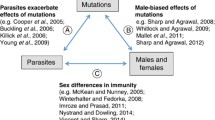Abstract
A study was made ofwillistoni-SR infections, transmitted for many generations through the maternal line, in two wild-type strains ofD. melanogaster. As in the species of origin, the SR agent is essentially lethal only to males. The twomelanogaster strains differ from each other in the time required for the effects of SR to be expressed, both in terms of the first appearance of SR broods and in the developmental stages at which death of males occurs. Host genotype within a species is thus an important factor in the expression of SR. Host age and breeding temperature are also of consequence in determining the degree to which SR is expressed. In any given instance, the specific expression of SR is determined by complex interactions between host, SR agent, and the environment.
Similar content being viewed by others
References
Counce, S. J. &D. F. Poulson (1962). Developmental effects of the “sex-ratio” agent in embryos ofDrosophila willistoni.J. Exptl. Zool. 151: 17–32.
Dixon, W. J. &F. J. Massey, Jr. (1957).Introduction to Statistical Analysis. McGraw Hill, New York, U.S.A.
Kellen, W. R. &W. Wills (1962). The transovarian transmission ofThelohania californica Kellen and Lipa inCulex tarsalis Coquillett.J. Insect. Path. 4: 321–326.
Magni, G. E. (1954). Thermic cure of cytoplasmic sex-ratio inDrosophila bifasciata. Proc. 8th Intern. Congr. Genet.:Caryologia (Suppl.)6: 1213–1216.
Malogolowkin, C. (1958). Maternally inherited sex ratio conditions inDrosophila willistoni andDrosophila paulistorum.Genetics 43: 274–286.
Malogolowkin, C. (1959). Temperature effects on maternally inherited “sexratio” conditions inDrosophila willistoni andDrosophila equinoxialis.Amer. Naturalist 93: 365–368.
Malogolowkin, C., D. F. Poulson &E. Y. Wright (1959). Experimental transfer of maternally inherited abnormal sex-ratio inDrosophila willistoni.Genetics 44: 59–74.
Poulson, D. F. (1963). Cytoplasmic inheritance and hereditary infections in Drosophila. Appendix III,Methodology in Basic Genetics. Ed.:W. J. Burdette. Holden-Day, Inc., San Francisco, U.S.A.
Poulson, D. F. &B. Sakaguchi (1961). Nature of the “sex-ratio” agent inDrosophila. Science133: 1489–1490.
Sakaguchi, B., K. Oishi &S. Kobayashi (1965). Interference between “Sex-Ratio” agents ofDrosophila willistoni andDrosophila nebulosa.Science 147: 160–162.
Sakaguchi, B. &D. F. Poulson (1961). Distribution of the “sex-ratio” agent in the tissues ofDrosophila willistoni.Genetics 46: 1665–1676.
Sakaguchi, B. &D. F. Poulson (1963). Interspecific transfer of the “sex-ratio” condition fromDrosophila willistoni toDrosophila melanogaster.Genetics 48: 841–861.
Steinhaus, E. A. (1949). pp. 309–310,Principles of Insect Pathology. McGraw-Hill, New York, U.S.A..
Williamson, D. L. (1965). Kinetic studies of “Sex-Ratio” spirochetes inDrosophila melanogaster Meigen females.J. Insect Path. 7: 493–501.
Williamson, D. L. (1966). Atypical transovarial transmission of Sex Ratio spirochetes byDrosophila robusta Sturtevant.J. Exptl. Zool. 161: 425–430.
Author information
Authors and Affiliations
Rights and permissions
About this article
Cite this article
Counce, S.J., Poulson, D.F. The expression of maternally-transmitted sex ratio condition (SR) in two strains ofDrosophila melanogaster . Genetica 37, 364–390 (1966). https://doi.org/10.1007/BF01547143
Received:
Issue Date:
DOI: https://doi.org/10.1007/BF01547143




